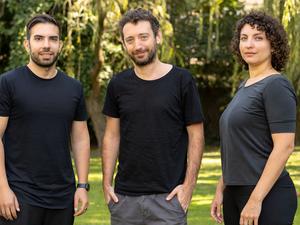
Tom Chi wants to destroy the industries that are destroying the planet, and he's doing that by investing in companies working on climate change solutions.
He co-founded the San Francisco-based venture firm At One Ventures in 2019 with Laurie Menoud and Helen Lin, and last year they raised its first fund which closed with $150 million. They've already invested in 22 companies, and the firm is aiming to deploy $1 billion over the next decade.
Chi was a founding member of Google's experimental moonshot division which launched in 2010 and was formerly known as Google X (it's now simply "X"). The incubator's most well-known projects include Waymo and Verily.
I spoke to Chi about how we should think about tackling climate change long term, if he thinks we should race to Mars and whether he’s optimistic about humanity’s ability to solve, or survive, the climate crisis.
Are you a climate change optimist or pessimist? I don't think I would be classed as either of those two things. Myself and my firm are very realistic about what the challenges look like. No. 1, we don't have one problem. We have many dozens of problems. So there's not likely one machine that'll solve all your problems.
We are very much realistic about the scale of the problems, the scope of the problems. There definitely is an idea going around like we have exactly 10 years to solve climate change, and if we don't, you know, the entire planet is destroyed. And that's also incorrect. It actually makes people do crazy things. If you were to go adjust the model a little bit and basically say, you know, over the years, we will find some ways to pull this stuff down, as well as limit what's going up, it changes the time table and it's not exactly 10 years anymore, it ends up being something more nuanced.
We should have a healthy amount of fear about this, but not a paralyzing amount of fear. And what you're effectively doing is you're squandering an extremely rare resource: Our talented, passionate folks that are going to work hard on these problems. And if you move them into despair or you have them operating out of the amygdala all the time, they will not be solving these problems.
How should people think about where they fit into this narrative? Just think about your skills and abilities and what it is that you do. Then recognize we need that for the climate work. For some people, all these folks that are engineers and scientists and the people that have made the things that I worked on, that type of person marching in the streets is not kind of your power, right? That's not the thing that you're going to uniquely do better than everybody. But for another person that is great at community organizing, or caring for people after a major adverse weather event, then that might be their role in this.
How should people think about climate change both in the short term and longer term? I think we need to think about this as work that we must do regardless of the timeline. The mission of our firm is not to go reduce carbon emissions a little bit, or even a billion times. The mission of the firm is to help humanity become a net positive in nature. That is a goal that is useful today. It's useful 10 years from now. It's useful years from now. If it took us a little longer to get it done, it would still be worth doing.
Also, the dystopian narratives that have taken over everything, it's like, do we even have 100 years to be here? We're gonna be here in 100 years. It got struck by an asteroid before that wiped out 90% of the life on Earth. The Earth's gonna be fine on this one. It's about are we going to be on a habitable planet? And what is our role going to be in that planet? And do we want to be the accidental roadkill based on the industrial choices that we made? Where do we want to go? And for things to really, really work, you're going to need tens of millions of people, not just a handful of talented people.
If Congress manages to pass a standalone climate bill, what do you think that they should prioritize in that spending? There are some things that are very difficult to do if we're talking about U.S. politics in particular. The subsidies on the fossil fuel industry, we just need to cancel them. That's one thing. We should use government money to make it expensive for the industry, but not for the consumer. Stop subsidizing the industry so hard. Subsidize the consumer during this transition period.
We should also be aware that it is very expensive to not solve the problems. The whole narrative around "this is too expensive," it's irresponsible. We're talking about spending $150 billion a year for all the programs compared to dealing with the effects of one storm, right? If your budget is designed so that you stop having those five events a year, or end up only having two instead of five, something that's a little bit more historically normal, then I think it's relatively clear that you're saving money.
Looking over the next year or so, what are some of the biggest trends that you're seeing around sustainability? Let's start with agriculture and food. Agriculture and food is one of the biggest areas where a person's regular day to day choices could make a big impact on the climate. The main thing is around proteins. Globally, protein production uses the majority of the farmland on the planet, but only provides like 18% of the calories.
We're exploring better ways of doing protein production, whether it is things like cellular agriculture or very tasty plant-based alternatives. I think that one of the big moves is we're going to have a lot more plant-based choices which are delicious, not just acceptable. And we are going to improve the functional sustainability of a lot of the ways that we're producing the rest of the meat protein. And this, this can happen in a number of ways. This can happen from a shift in the mix.
For example, things like beef and lamb have got a huge carbon footprint per pound or kilogram of meat. Something like chicken, fish and eggs is substantially less. So, I think that there'll be some changes in the mix. I also think that there will be better practices that are coming for a lot of types of animal agriculture. The tricky thing is that it requires the growers, ranchers, the folks that are effectively working the land to do their business differently. And amongst the folks that are passionate about it, they're leading the way already.
And how about the building construction and manufacturing spaces? We definitely see that there's going to be some things coming down the road reasonably soon in terms of cement alternatives. On the steel side, we have a bet on decarbonizing steel, but I will say that there's very few of those bets in the world because industrial processes is a very large contributor. It's like 20% of total greenhouse gasses, which makes it almost as large as all of electricity generation.
There's a number of folks that are working on wood and wood alternatives. I live in a building right now that was built in 1910. And it's a wood frame building, and all the wood in there is still fine. It doesn't biodegrade if you don't allow it to get sopping wet or covered with fungus or whatever. So I think we will be able to decarbonize a bunch of construction by moving to materials that intrinsically catch carbon, like wood, and just have creative ways to go use those materials for the scale of building that we're interested in.
And then there's a bunch of things on the building controls perspective. Either shifting the usage of energy to be able to save power by using energy at lower cost times or times when a renewable grid is the main source. And just improving the comfort by controlling temperature, effectively better HVAC systems. Thermal storage is a relatively newer trend on this front. I don't know that we've totally cracked the code yet.
And can you talk a little bit about the energy and transportation sector? There is the grid storage and baseload battle. There is a push for battery-based grid storage. We think that's not going to go and stick for anything other than real specialized cases, like maybe some island nations or some refugee type things on some small micro grids. But we don't think that lithium-based battery technology is appropriate for large scale grid storage. So that's one thing that we are tracking.
In terms of baseload, there's interesting experiments. There's a number of things happening around future fission reactors which will provide baseload alternative hydro. We're not doing great on having a bunch of baseload options. It seems right now that it's more likely that we'll over build the renewable grid, and we'll have too much capacity some of the time and not enough capacity other parts of the time. It's less efficient than it could be, but we don't have a lot of other options on that at the moment.
And what about ecosystem restoration? Our companies are the ones that are furthest in the world on it, like Dendro, which is the tree planting drones. They're doing larger and larger contracts. They're in the many 1,000s of hectares for restoration contracts. They're gonna have the ability to do 100,000 quite soon. Scale is very material, both in terms of just the amount of physical area we're talking about as well as a world where carbon markets of any stripe may become a really viable way to go and get additional carbon in the ground via the building of healthy ecosystems.
So we see all that coming down the pipe. We've been seeing it develop over the last five years and it's at a real interesting point now because we've done really high quality restorations and a lot of environments already. Then Colossal which is de-extinction species which, I must say, there's still some science to do and also that's the team in the world that's most likely to crack it. So we're not upset at all with the with the investment decision, but it will take some time.
What about the race to Mars? I'm a former astrophysicist and would love for us to go and understand the stars better. The actual rationale that people are using here is fully incorrect, though. Once you become of a place within a certain number of generations, and that's typically six to 20 generations, we speciate. So, when you go to a place like Mars, which is 1/3 of the gravity, we've seen speciation for way smaller differences than that. And if you keep the human population on Mars for six to eight generations, they will not be humans anymore.
I think there's a foundational part of the narrative which is wrong, which is we're going to become a multiplanetary species. Wherever we go, we become a species of that place. That's the nature of our DNA. That's how all of life on Earth became what it is. We started with the same roots and we diversified in all these things, as a function of place.
I'm not intrinsically against exploring the stars. That's what I did as part of my career. But we should go to other planets at a point in time where we are a species that's good at taking care of planets. And we're not that species right now. And you can tell because a bunch of the folks that are getting into this early on are like, "Oh, we're gonna go with these asteroids, and we're gonna mine them out." I was like, oh, my God. I mean, isn't that exactly what got us into all this trouble on this planet?
We can actually build a system that goes and defends against asteroid strikes. That's actually a way easier task than colonizing a different planet. Maybe that doesn't sound as inspiring. I think we should send some people to Mars, just because it is inspiring. I don't mind doing a thing from time to time, just because it's cool.







